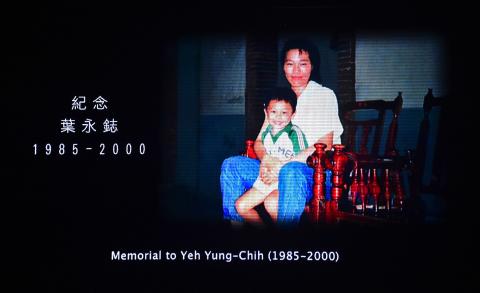On the morning of April 20, 2000, Yeh Yung-chih (葉永鋕) asked his teacher to go to the bathroom before class ended. A few minutes later, his lifeless body was found on the bathroom floor in a pool of blood. He was only 15.
Born in 1985, Yeh was a student at Gaoshu Junior High School in Pingtung County’s Gaoshu Township (高樹) who had been constantly bullied by his schoolmates due to his alleged effeminate behavior.
“After he entered junior high, he told me that some bullies would seize him and pull his pants off in the school toilet,” recalled his mother, Chen Chun-ju (陳君汝), who described him as a nice, tender and considerate boy who liked to cook.

Photo: Pan Shao-tang, Taipei Times
Chen repeatedly complained, but school officials did nothing. As a result, her son didn’t dare to enter the bathroom during recess. He usually did so five minutes before or after a break just to avoid harassment, or asked his friends to accompany him.
The Institute of Forensic Medicine under the Ministry of Justice concluded that Yeh died of severe brain injuries due to head trauma after suffering a heart attack and collapsing.
However, National Taiwan University’s College of Medicine disagreed, arguing that it was unlikely for a young and healthy boy to suddenly die of a heart attack since he did not have any medical history of heart problems.

Photo: Pan Shao-tang, Taipei Times
SOCIAL IMPACT
In 2006, the Taiwan High Court’s Kaohsiung Branch sentenced the school’s principal and two school officials to five months, four months and three months, respectively, in prison for “neglecting the degree of care required by their occupation.”
But Yeh’s death has remained an unsolved mystery because there was no concrete evidence to show that his death was the result of bullying. Although nobody was convicted of murder, the long-term bullying that he had endured for almost three years almost certainly contributed to the tragedy. What happened to Yeh might never be known.
Embracing the Rose Boy (擁抱玫瑰少年), a book written in memory of Yeh by the Taiwan Gender Equity Education Association (台灣性別平等教育協會), was published by Fembooks Publishing House and Bookstore (女書文化公司) in 2006. The association coined the term “rose boy” to refer to boys with feminine gender characteristics, calling on people to respect such differences.
Following Yeh’s death, the Ministry of Education transformed its Gender Equality Education Committee (兩性平等教育委員會) — literally translated as “the committee of equality education of two sexes” in Chinese — into the broader Gender Equity Education Committee (性別平等教育委員會) to promote diverse gender education beyond the two gender stereotypes.
The government also enacted the Gender Equity Education Act (性別平等教育法) in 2004, stating that the “school shall provide a gender-fair learning environment, respect and give due consideration to students, faculty and staff with a different gender, gender temperament, gender identity and sexual orientation.”
Still, bias, discrimination and bullying continue to exist on and off campus across the nation.
THE DOCUMENTARY FILM
In November last year, director Hou Chi-jan (侯季然) released a documentary, The Rose Boy (玫瑰少年, www.youtube.com/watch?v=V_M9ZId2QAY), in tribute to Yeh.
Singer Jolin Tsai (蔡依林), an active supporter of the lesbian, gay, bisexual and transgender (LGBT) community, played the five-minute documentary at her Taipei concerts in November, as tens of thousands of fans were moved to tears.
A report about the video became the most-read story on the Liberty Times’ (the Taipei Times’ sister newspaper) Web site, and many remain curious about the events surrounding the unsolved death.
The documentary shows Yeh’s mother giving a speech in 2010 at the Kaohsiung LGBT Pride Parade (高雄同志遊行), where she encouraged participants who faced similar experiences to be brave.
“Don’t cry kids, because it will make us look cowardly,” she said. “We haven’t done anything wrong, and we are fighting for our rights.”
Unfortunately, neither Taiwanese officials nor the general public seem to have learned much from Yeh’s death, while teens who don’t conform to gender stereotypes are bullied everyday.
Even going to the toilet at school could be a nightmare for them.
Yeh would have turned 31 if he were still alive and could have become the chef that he had always dreamed of being.
As Tsai said at one of her Taipei concerts: “We are always looking for acceptance by others and have been taught what is ‘normal’ while forgetting to tolerate others.” The Taipei Watcher highly recommends this inspiring documentary, and hopefully Yeh’s tragic story can serve as a lesson so that a tragedy like this will never happen again.

That US assistance was a model for Taiwan’s spectacular development success was early recognized by policymakers and analysts. In a report to the US Congress for the fiscal year 1962, former President John F. Kennedy noted Taiwan’s “rapid economic growth,” was “producing a substantial net gain in living.” Kennedy had a stake in Taiwan’s achievements and the US’ official development assistance (ODA) in general: In September 1961, his entreaty to make the 1960s a “decade of development,” and an accompanying proposal for dedicated legislation to this end, had been formalized by congressional passage of the Foreign Assistance Act. Two

Despite the intense sunshine, we were hardly breaking a sweat as we cruised along the flat, dedicated bike lane, well protected from the heat by a canopy of trees. The electric assist on the bikes likely made a difference, too. Far removed from the bustle and noise of the Taichung traffic, we admired the serene rural scenery, making our way over rivers, alongside rice paddies and through pear orchards. Our route for the day covered two bike paths that connect in Fengyuan District (豐原) and are best done together. The Hou-Feng Bike Path (后豐鐵馬道) runs southward from Houli District (后里) while the

March 31 to April 6 On May 13, 1950, National Taiwan University Hospital otolaryngologist Su You-peng (蘇友鵬) was summoned to the director’s office. He thought someone had complained about him practicing the violin at night, but when he entered the room, he knew something was terribly wrong. He saw several burly men who appeared to be government secret agents, and three other resident doctors: internist Hsu Chiang (許強), dermatologist Hu Pao-chen (胡寶珍) and ophthalmologist Hu Hsin-lin (胡鑫麟). They were handcuffed, herded onto two jeeps and taken to the Secrecy Bureau (保密局) for questioning. Su was still in his doctor’s robes at

Mirror mirror on the wall, what’s the fairest Disney live-action remake of them all? Wait, mirror. Hold on a second. Maybe choosing from the likes of Alice in Wonderland (2010), Mulan (2020) and The Lion King (2019) isn’t such a good idea. Mirror, on second thought, what’s on Netflix? Even the most devoted fans would have to acknowledge that these have not been the most illustrious illustrations of Disney magic. At their best (Pete’s Dragon? Cinderella?) they breathe life into old classics that could use a little updating. At their worst, well, blue Will Smith. Given the rapacious rate of remakes in modern